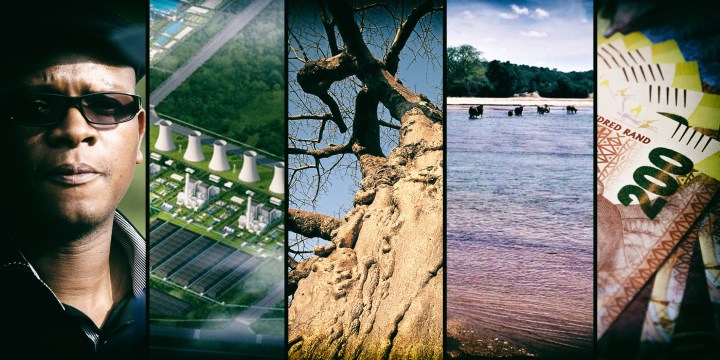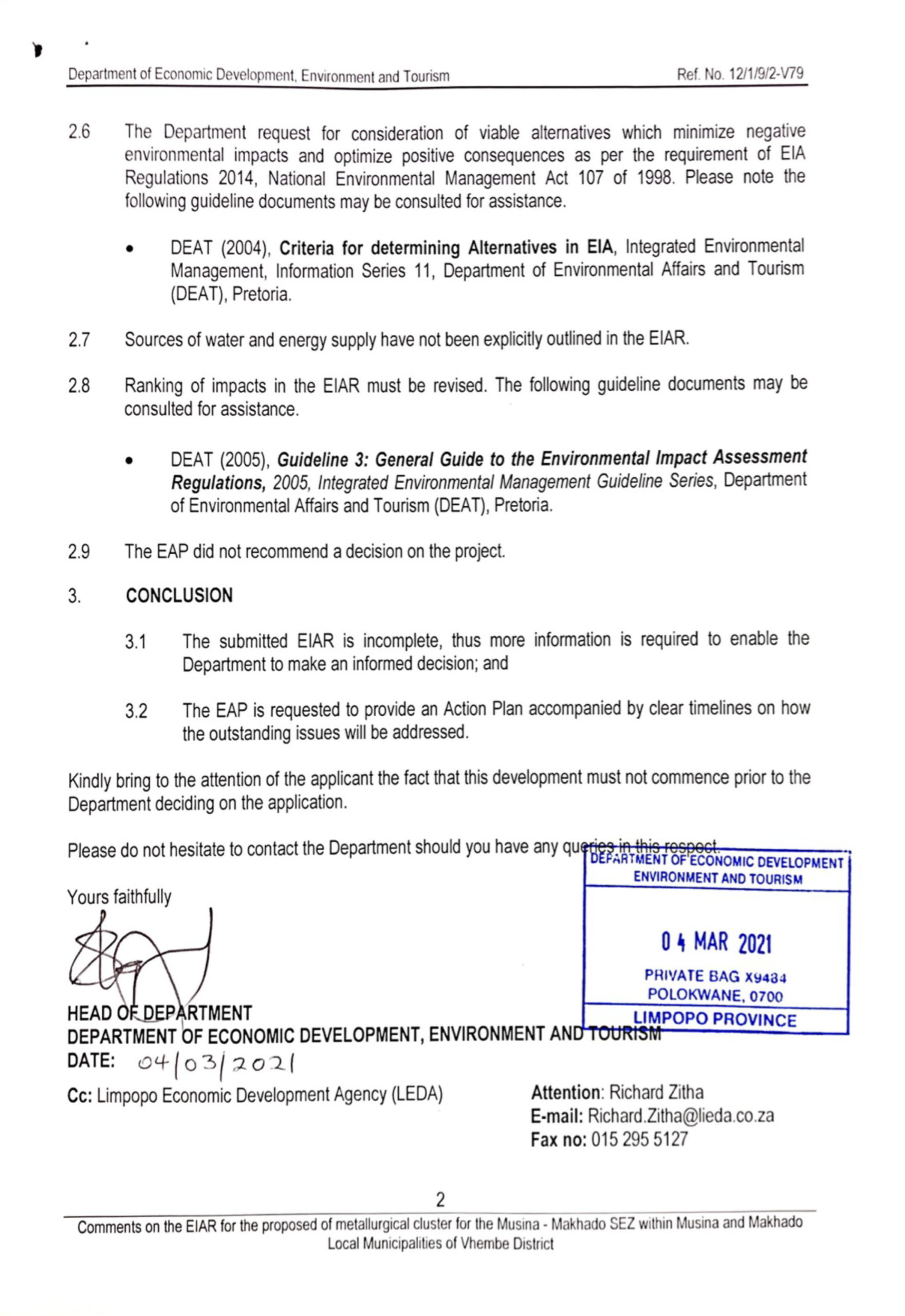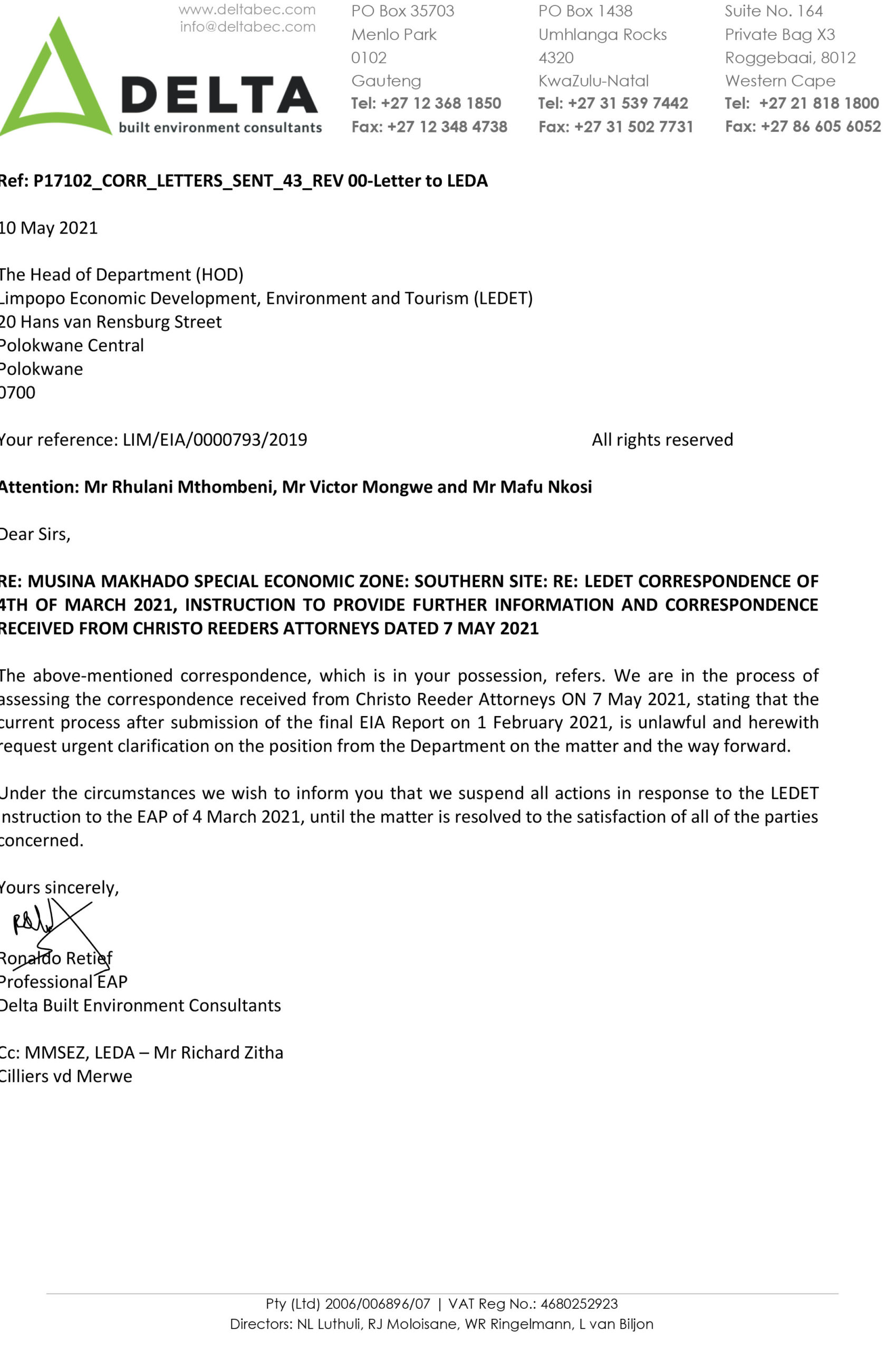OUR BURNING PLANET
Killing the Holy Ghost: Inside the unlawful bid for environmental approval of the Musina-Makhado SEZ

On 1 September 2020, the draft environmental impact assessment for the R145bn Musina-Makhado SEZ was released for public comment. What followed, given the absolute devastation that the project would visit on the Limpopo River basin, were delays and about-turns that often verged on the unlawful. But on 19 May 2021, the local implementing agents for the China-backed initiative may have crossed the point of no-return — a high court review is almost certain, it now seems, with the law as clear as day.
(For more in the Killing the Holy Ghost series, read Kevin Bloom’s three investigative features here, here and here, and Brandon Abdinor’s report on the draft environmental impact assessment here.)
On the morning of 15 March 2021, in among the thousands of virtual meetings that were happening across South Africa, there was one in particular that underlined the hopeless banality of human-induced ecosystem collapse. The humans in question had logged on to discuss a range of acronyms that made sense mainly to them, but which to an outsider would have been essential to an understanding of the broader picture of ruin. In order of importance, those acronyms were as follows:
MMSEZ: The Musina-Makhado Special Economic Zone, a proposed China-funded 8,000ha metallurgical cluster in the baobab-laden Limpopo River Valley, which would be powered by its own 3,000MW coal-fired plant, draw water from drought- and famine-stricken Zimbabwe, and generally lay waste to the transnational ecosystems upon which millions of livelihoods depended.
LEDET: The Limpopo provincial government’s Department of Economic Development, Environment and Tourism, which, instead of Minister Barbara Creecy’s national department — as befitted a R145-billion project backed by some of the largest industrial conglomerates in the People’s Republic, including Shenzhen Hoi Mor, the Power Construction Corporation of China and the Taiyuan Iron and Steel Group — had been chosen as the “competent authority” over the all-important process of environmental authorisation for MMSEZ.
LEDA: The Limpopo Economic Development Agency, the lead South African implementing agent for MMSEZ, which — as Daily Maverick reported in April 2020 — had allegedly pulled the wool over the eyes of the indigenous custodians of the land, not least by neglecting to disclose their deal with Power China International for construction of the abovementioned coal-fired plant.
EIA: The Environmental Impact Assessment report, as required by the National Environmental Management Act of 1998 (or NEMA, another critical acronym), which the Department of Trade and Industry had “targeted for completion” on MMSEZ by the close of 2020.
EAP: Environmental Assessment Practitioner, the qualified and independent professional responsible for the drafting of the EIA, who in this case — under the appointment of LEDA, the so-called “applicant” — had been identified as Nico-Ronaldo Retief, a senior employee of Delta Built Environmental Consultants, or Delta BEC.
And so, with that out of the way, there was also the background to the virtual meeting of 15 March to consider, without which an outsider would not have been able to decipher the first thing about its purpose, cryptically defined as “EIA clarity on comments received from LEDET on 4 March 2021”.
It had all kicked off on 1 September 2020, when Delta BEC, on the instruction of LEDET, had released the MMSEZ draft EIA for public comment, a process originally intended to last the prescribed 50 days, until 22 October 2020. Unsurprisingly, given the restrictions on public gatherings brought on by Covid-19, the EAP had requested an extension to 31 October, which LEDET had granted. But on 16 October, when he realised that there was no hope of submitting the paperwork on time, Retief had asked for a further extension, all the way out to 31 March 2021. Eleven days later, with the deadline looming and no answer from LEDET, a “revised request with additional motivation” was sent.
As an experienced EAP with many years in the game, the motivations that Retief had provided were as detailed as they were disturbing. Among dozens of others, they included the fact that 8,000 pages of primary and supporting documentation had to be studied, assimilated and reviewed; that 2,500 public objections had already been received, with many more expected; and that the technical and scientific objections alone would “take approximately one month to address by the EAP and a further month to be addressed by the respective specialists…”.
The upshot was a response from LEDET dated 26 October — curiously, the day before the EAP had sent his revised request — which stated that a final extension had been granted, but only until 31 January 2021. Implicitly, a failure to meet this deadline would result in the project being treated as lapsed.
“Please bear in mind that there will be no further extension of timeframe on the public participation process or any part of the EIA process,” noted LEDET in the correspondence, “as this project is way outside the timeframes as stipulated in the EIA Regulations, 2014.”
Of course, when Retief then submitted the EIA on 1 February 2021, it was utterly and hopelessly incomplete. Whether the senior bureaucracy at LEDET was stalling for time or simply immobilised, it took more than a month for the provincial department to get back to Retief, with a letter that basically repeated many of the problems that he had foreseen.

It took more than a month for the provincial department to get back to Nico-Ronaldo Retief, with a letter that basically repeated many of the problems that he had foreseen.
The “water and energy supply has not been explicitly outlined”, LEDET noted, before complaining that Retief “did not recommend a final decision on the project”. To add to the farce, LEDET asked the EAP to “provide an action plan accompanied by clear timelines”, which, as everyone must have known, was in further contravention of the regulations that they themselves had cited.
This, then, was the background to the “comments received from LEDET on 4 March 2021” — and the virtual meeting of 15 March, instead of offering Retief his sought-after “clarity”, turned out to be just further confirmation of the extent of the charade.
***
The meeting opened with Retief, who by this point had the vocal tenor of a man who wished he was somewhere else, addressing Rhulani Mthombeni of LEDET. The first item on the agenda was the so-called “insufficiency” of the public participation process, given that the forums were held in English and not any of the local vernaculars, such as Sepedi, Xitsonga and Tshivenda. After an inconclusive back-and-forth between Retief and Mthombeni, Richard Zitha of LEDA felt the need to intervene.
“Maybe if I may ask through you, Mr Chair,” Zitha said to Retief, “what is the source of the comment? Did LEDET get the impression that there was no translation on the ground? Or did they pick it up from the final report that was submitted? Because, quite clearly, the view from our side is different.”
As the majority shareholder in MMSEZ, it was apparent from Zitha’s statement that LEDA was losing patience with the process. Zitha, as readers of the first investigation in this series may remember, was the man who denied that the agreement with Power China International — for the 3,000MW coal-fired plant — was a “material change” to the lease that LEDA had signed with the indigenous landowners.
Suggesting, as was probably always on the cards, that the meeting had very quickly devolved into a conflict between competing interests: in the left corner, the men who were required by law to uphold the provisions of NEMA; in the right corner, the men who were required by the highest echelons of the South African executive to make good on the deals that had been signed with the People’s Republic of China.
And on it went until the 38th minute, when Lehlogonolo Masoga, the recently appointed CEO of the MMSEZ operating company, asked a question that inadvertently exposed the entirety of the sham. Masoga, who in the space of two days in May 2019 had made headlines for running up an unpaid R125,000 phone bill and allegedly assaulting a DJ at a party (at the time, he was deputy speaker of the Limpopo provincial legislature), wanted to know about Ekland Safaris, the exclusive private hunting resort in the region that was controlled, according to amaBhungane, by Saudi crown prince Mohammed bin Salman.
“Masoga here,” he said, “and my question this time goes to Mthombeni.”
“Yes,” responded the LEDET representative.
“Mthombeni, your people of Ekland Safaris, they have sent us a copy of their EIA approval and it is dated 20 November 2020. That is three years after they have completed their infrastructure. Meaning, they have built their hotels and that big fence without an EIA approval. Is that correct?”
“That is correct,” said Mthombeni, “but let me just respond to that.”
An outburst of sardonic laughter now erupted from one of the members of the meeting. “No laughing!” said Masoga.
Mthombeni continued: “The CEO is correct. But the approval that you have seen from Ekland Safaris came through a process that we call ‘section 24G’, which comes with a fine. In fact, it’s confidential…”
“They gave it to us, it’s not confidential to us,” said Masoga, his tone rising, “they gave it to us voluntarily!”
“Yes,” said Mthombeni, “I want to indicate, that is the product of a process whereby they were fined around R2.5-million… as a fine, for having developed whatever they developed unlawfully.”
Mthombeni again referred to section 24G of NEMA, stating that the fine was subsequently paid to the department. But then, as was clearly his intention, came the kicker from Masoga.
“Meaning, if I’ve got R2.5-million, Mr Mthombeni, I can go on-site and construct the SEZ and pay your fine later?”
A recording of the virtual meeting.
Again, the same sardonic laughter from the same member of the virtual meeting.
“Mr CEO,” said Mthombeni, “according to the regulations, we can go as much as R10-million, but the fact that we have the section 24G process… doesn’t necessarily mean that we promote non-compliance…”
For Masoga, though, it didn’t end there. He wanted to know whether Ekland Safaris, which had apparently lodged an objection against the MMSEZ draft EIA, had a “moral leg” to stand on.
“Do they,” he asked, “when we are following the painful process to the letter?”
***
Six weeks later, on Friday, 30 April 2021, a public participation meeting was held at the Fire & Ice Hotel in Pretoria that suggested the process was about to get a whole lot more painful. The meeting, a transcript of which was obtained by Daily Maverick, was essentially a standoff between Retief and attorney Christo Reeders, whose clients included the Western Soutpansberg Nature Reserve Association and the Endangered Wildlife Trust. Retief, as ever, was on the back foot, but this time he was being called to account on the EIA Regulations, as gazetted in 2014 under sections 24(5) and 44 of NEMA.
The problem for Retief was regulation 24, which stated that “the competent authority must within 107 days of receipt of the environmental impact report” either grant or refuse authorisation.
“So we have a situation where there’s a peremptory legislative provision that has to be complied with by the 19th of May,” said Reeders, “that’s the end of the 107-day period. Is that correct?”
“Ja, that’s correct,” replied Retief. “LEDET did indicate that they are pausing the timeframes and they are not looking at the 107 days any more.”
“On what basis, Mr Retief?”
“I don’t know. The case officer, Mr Mongwe, did indicate that to me, so I asked; he didn’t give me an indication of what reason, why they paused it.”
“Well,” said Reeders, “can we at least reach some agreement that unless there’s a legislative provision that provides for that, that decision is unlawful?”
“Ja. That’s basically… as you say, it will be unlawful.”
“Yes. Yet here we are. Why do we comply with certain pieces of legislation when others are ignored? I mean, this isn’t the type of thing that one makes up as we go along, not so?”
But, as far as Daily Maverick could ascertain, this was exactly what the relevant authorities had been doing — making up the rules as they went along. There was no response from Victor Mongwe, head of the EIA section at LEDET, to the question sent to him regarding the citation of his name at the public participation meeting on 30 April; neither was there a response to Daily Maverick from LEDET’s Rhulani Mthombeni on the lawfulness (or otherwise) of the various extensions.
Retief, on the other hand, got back to us almost immediately. “Delta BEC will forward this to the applicant and then revert to you,” he wrote.
Unfortunately, the applicant had decided to ignore our questions too.
“Are you aware,” we asked LEDA’s Richard Zitha, “in terms of Regulation 24 of the EIA Regulations of 2014, that today — 19 May 2021 — is the deadline for LEDET to either approve or deny environmental authorisation for MMSEZ? If you are aware, do you dispute that it would be unlawful in terms of NEMA for the environmental authorisation process to continue past this date?”
What Retief and Zitha both knew, of course, was that on 10 May Delta BEC had sent a letter to LEDET, effectively resigning from the process until further clarity was forthcoming.
“Under the circumstances,” Retief had written to Mongwe and Mthombeni, “we wish to inform you that we suspend all actions in response to the LEDET instruction to the EAP of 4 March 2021, until the matter is resolved to the satisfaction of all of the parties concerned.”

The last straw for the EAP, it appeared, had been the missive Reeders sent a few days earlier to just about everyone in South Africa involved with the legalities and implementation of MMSEZ — including Mongwe, Mthombeni, Zitha, Masoga and Minister Barbara Creecy, among dozens of others — which laid out, in painstaking detail, the entire history of the farce stretching back to October 2020.
And so, as it turned out, the only response we received to our questions was from the MMSEZ special operating company, with marketing manager Shavana Mushwana answering on behalf of the CEO.
Did Masoga confirm or deny that he had asked Mthombeni, during the virtual meeting of 15 March 2021, whether — like Ekland Safaris — he could “go on site and construct the SEZ and pay [the R2.5-million fine] later”?
“The MMSEZ is not apologetic about following the due process of law to obtain the requisite environmental authorisation,” Mushwana replied, somewhat elusively. “As a responsible corporate citizen the company does not believe in cutting corners in pursuit of its strategic and ambitious objective of making a significant contributing [sic] to the industrialisation of the country’s economy.”
Was Masoga aware that 19 May was the deadline for LEDET to either approve or deny environmental authorisation?
Again, a vague and elusive non-answer:
“It is MMSEZ’s understanding that the competent authority can only adjudicate on an application based on the submitted Final EIA Report (FEIAR) by the applicant. MMSEZ is complying with the directives of the competent authority to conduct further public participation and provide a comprehensive mitigation plan before submitting the Final EIA Report in due course.”
Except maybe this answer wasn’t so elusive; maybe, by refusing to acknowledge the EIA Regulations, Mushwana was confirming what Retief had told Reeders on 30 April — that LEDET was “pausing the timeframes” and “not looking at the 107 days any more”.
Certainly, that was the interpretation of Reeders and his clients.
At 4.15 on the afternoon of 19 May, another missive was fired off to Mongwe, Zitha and Masoga under the letterhead of Christo Reeders Attorneys.
“There is therefore no alternative available to you but to issue a negative decision in respect of the application for environmental authorisation for the abovementioned project,” it stated. “The negative decision falls to be confirmed today.”
And then, in the very next point:
“Unless we receive the negative decision by close of business on Friday, 21 May 2021 we hold instructions to immediately commence with High Court review proceedings in terms of the provisions of High Court Rule 53 as read with, inter alia, Section 6(2)(g) as read further with Section 7(2)(c) of the Promotion of Administrative Justice Act, 3 of 2000. No appeal is available in the context of a failure to make a decision.”
As of this writing, no decision from LEDET has been received. DM






















 Become an Insider
Become an Insider
Is it remotely possible that the relevant authorities can create a map for everybody concerned,as to where no mining is allowed, across the whole of SA ,with the letter of the law as regards ,acts ,laws etc that is there, so that all Conservations areas ,is highlighted ,and the moment contraventions
are broken ,be sent to an organization,which includes Richard Spoor,so that action ,can be taken immediately to stop these wild cat actions?I think not as Kickbacks will be lost as a source of income